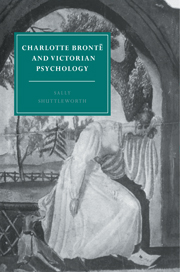Book contents
- Frontmatter
- Contents
- Acknowledgements
- Introduction
- PART ONE PSYCHOLOGICAL DISCOURSE IN THE VICTORIAN ERA
- PART TWO CHARLOTTE BRONTË'S FICTION
- 6 The early writings: penetrating power
- 7 The Professor: ‘the art of self-control’
- 8 Jane Eyre: ‘lurid hieroglyphics’
- 9 Shirley: bodies and markets
- 10 Villette: ‘the surveillance of a sleepless eye’
- Conclusion
- Notes
- Index
- CAMBRIDGE STUDIES IN NINETEENTH-CENTURY LITERATURE AND CULTURE
10 - Villette: ‘the surveillance of a sleepless eye’
Published online by Cambridge University Press: 06 November 2009
- Frontmatter
- Contents
- Acknowledgements
- Introduction
- PART ONE PSYCHOLOGICAL DISCOURSE IN THE VICTORIAN ERA
- PART TWO CHARLOTTE BRONTË'S FICTION
- 6 The early writings: penetrating power
- 7 The Professor: ‘the art of self-control’
- 8 Jane Eyre: ‘lurid hieroglyphics’
- 9 Shirley: bodies and markets
- 10 Villette: ‘the surveillance of a sleepless eye’
- Conclusion
- Notes
- Index
- CAMBRIDGE STUDIES IN NINETEENTH-CENTURY LITERATURE AND CULTURE
Summary
Brontë's final novel, Villette, represents her most explicit engagement with Victorian psychological theory and medical practice. The narrator, Lucy Snowe, is subject, seemingly, to hallucinations, undergoes a total nervous collapse, and discusses her symptoms at great length with her doctor. Whereas Brontë had distanced Jane Eyre from the mania of her ‘darkest double’, Bertha, and preserved Caroline Helstone from the unbecoming display of ‘weariness ferment[ing] … to phrenzy’ she creates in Lucy Snowe a figure whose psychological stability is permanently in question. In probing the inner processes of mind of a subject who defines herself as ‘constitutionally nervous’ (p. 531), Brontë has chosen to focus not on the flamboyant extreme of ‘mania’, but on the more subtle area of neurosis. The reader, entering the world of Villette, is forced to relinquish cherished assumptions of rational order. Lucy as narrator teases and bewilders her audience, contradicting herself, withholding vital information, and confounding, as in the notorious open ending, biographical fact with readerly desire. Her commitment to evasion and displacement is articulated in the very title of her book, which gives precedence not to selfhood but to place. Through the autobiographical account of ‘shadow-like’ Lucy, Brontë both explores and interrogates contemporary theories of mental alienation.
In Shirley, Brontë had examined how social and political issues could impinge directly on the life of the body and mind. Villette takes further this exploration of the interaction between the social and psychological economies, focusing this time on the personal and institutional operations of surveillance.
- Type
- Chapter
- Information
- Charlotte Brontë and Victorian Psychology , pp. 219 - 242Publisher: Cambridge University PressPrint publication year: 1996



